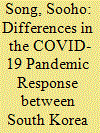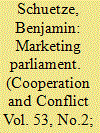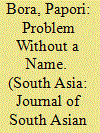|
|
|
Sort Order |
|
|
|
Items / Page
|
|
|
|
|
|
|
| Srl | Item |
| 1 |
ID:
132324


|
|
|
|
|
| Publication |
2014.
|
| Summary/Abstract |
In order to assess the impact of culture on state behavior in international crises, specifically with regard to mediation and its outcome, this study tests hypotheses rooted in both the international relations and the cross-cultural psychology literatures, implementing analysis at both the international-system level and the domestic-state-actor level. At the international system level, the study finds that cultural difference between adversaries affects whether or not mediation occurs during an international crisis but has no effect on tension reduction. At the domestic state actor level, we find that there are certain facets of cultural identity that make a state more or less open to requesting or accepting third-party mediation during an international crisis, but that these facets have no effect on tension reduction.
|
|
|
|
|
|
|
|
|
|
|
|
|
|
|
|
| 2 |
ID:
189471


|
|
|
|
|
| Summary/Abstract |
The impact of the COVID-19 pandemic has varied across countries. Some countries controlled the virus relatively well, while others did not. In the United States, almost a million people died. However, South Korea’s death toll is only about 12,000 even though its population is about one-sixth of the United States. What caused the difference? We argue that public compliance to government direction is the primary reason. South Korea’s collective culture valuing communal benefits helped the people conform to government directions, such as mask wearing in public places. By contrast, American people resisted the government policies that restrict individual freedom due to the individualistic culture. In South Korea, historical experiences of relatively frequent national crises led to the rise of defensive nationalism, resulting in national union. However, the United States had relatively fewer national crises, and thus nationalism did not rise. Instead, national division, xenophobia, and hatred toward Asians prevailed in the United States. Besides the cultural differences, differences in national leader’s characteristics, past experiences of public health crisis, and political system also contributed to the different outcomes of the crisis.
|
|
|
|
|
|
|
|
|
|
|
|
|
|
|
|
| 3 |
ID:
159967


|
|
|
|
|
| Summary/Abstract |
The Jordanian parliament is widely recognised as a patronage provider and means for authoritarian upgrading. Despite, or precisely because of this, it has over the past years become a linchpin of US and European attempts at parliamentary strengthening. The parliament’s highly marginalised position notwithstanding, this article suggests that such efforts provide us with an insightful opportunity to better understand the reconfiguration of authoritarian power via external intervention in the name of democracy. Discussing the contradictory effects of parliamentary strengthening programmes in Jordan, the article tries to shift the discussion of democracy promotion away from a concern with policy, conceptual debates and intentions to one with democracy promotion’s constitutive effects. As such, the article investigates the framing of Jordanian politics within a market rationale as central mechanism for the de-politicisation of uneven power relations. Further, it explores the ways in which democracy promotion serves to seemingly reconfirm interveners’ desired self-understandings via the maintenance of assumptions of cultural ‘difference’. Ultimately, it is suggested that decentring the study of democracy promotion by paying more attention to its constitutive effects provides us with a better understanding of why and how increasing democracy promotion portfolios have, in Jordan, had the effect of strengthening authoritarianism.
|
|
|
|
|
|
|
|
|
|
|
|
|
|
|
|
| 4 |
ID:
168818


|
|
|
|
|
| Summary/Abstract |
This paper is about race and race relations in India with a focus on the experiences of violence and discrimination that people from India’s Northeast face in mainland India. This has become a ‘problem without a name’, generally articulated as a problem of cultural difference. The paper argues that the emphasis on cultural difference elides the issue of racism faced by India’s north-eastern subjects, whereby culture is a mere substitute for race. Institutional approaches to racism tend to rely on a biological understanding of race. The paper demonstrates the racial formation of the category ‘north-eastern’ through the processes of colonialism, nationalism and counter-insurgency. This approach shows the ways in which racism, classism and sexism work together in constituting the racialised, gendered and classed north-eastern subject.
|
|
|
|
|
|
|
|
|
|
|
|
|
|
|
|
|
|
|
|
|